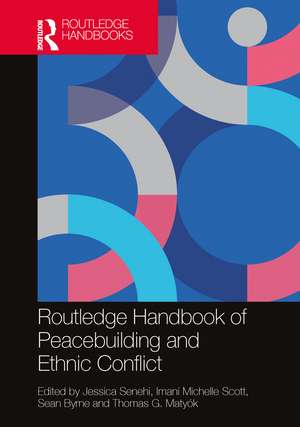Routledge Handbook of Peacebuilding and Ethnic Conflict
Editat de Jessica Senehi, Imani Michelle Scott, Sean Byrne, Thomas G. Matyóken Limba Engleză Paperback – 26 aug 2024
Comprising 28 chapters that present key insights on peacebuilding in ethnic conflicts, the volume has implications for teaching and training, as well as for practice and policy. The handbook is divided into four thematic parts. Part 1 focuses on critical dimensions of ethnic conflicts, including root causes, gender, external involvements, emancipatory peacebuilding, hatred as a public health issue, environmental issues, American nationalism, and the impact of the COVID-19 pandemic. Part 2 focuses on peacebuilders’ roles, including Indigenous peacemaking, nonviolent accompaniment, peace leadership in the military, interreligious peacebuilders, local women, and young people. Part 3 addresses the past and shaping of the future, including a discussion of public memory, heritage rights and monuments, refugees, trauma and memory, aggregated trauma in the African-American community, exhumations after genocide, and a healing-centered approach to conflict. Part 4 presents case studies on Sri Lanka’s postwar reconciliation process, peacebuilding in Mindanao, the transformative peace negotiation in Aceh and Bougainville, external economic aid for peacebuilding in Northern Ireland, Indigenous and local peacemaking, and a continuum of peacebuilding focal points. The handbook offers perspectives on the breadth and significance of peacebuilding work in ethnic conflicts throughout the world.
This volume will be of much interest to students of peacebuilding, ethnic conflict, security studies, and international relations.
| Toate formatele și edițiile | Preț | Express |
|---|---|---|
| Paperback (1) | 430.97 lei 43-57 zile | |
| Taylor & Francis – 26 aug 2024 | 430.97 lei 43-57 zile | |
| Hardback (1) | 1557.29 lei 43-57 zile | |
| Taylor & Francis – 22 aug 2022 | 1557.29 lei 43-57 zile |
Preț: 430.97 lei
Nou
Puncte Express: 646
Preț estimativ în valută:
82.47€ • 86.32$ • 68.64£
82.47€ • 86.32$ • 68.64£
Carte tipărită la comandă
Livrare economică 31 martie-14 aprilie
Preluare comenzi: 021 569.72.76
Specificații
ISBN-13: 9781032286433
ISBN-10: 1032286431
Pagini: 392
Ilustrații: 14
Dimensiuni: 174 x 246 mm
Greutate: 0.64 kg
Ediția:1
Editura: Taylor & Francis
Colecția Routledge
Locul publicării:Oxford, United Kingdom
ISBN-10: 1032286431
Pagini: 392
Ilustrații: 14
Dimensiuni: 174 x 246 mm
Greutate: 0.64 kg
Ediția:1
Editura: Taylor & Francis
Colecția Routledge
Locul publicării:Oxford, United Kingdom
Public țintă
Academic, Postgraduate, Professional, and Undergraduate AdvancedCuprins
Introduction Introduction: Peacebuilding and ethnic conflict Part 1: Key Dimensions of Ethnic Conflicts 1. The roots of ethnopolitical conflict 2. How gender is implicated in ethnopolitical conflict 3. Complex effects of external involvements in ethnopolitical violence 4. Re-examining peacebuilding priorities: Liberal peace and the emancipatory critique 5. Hatred is a contagious disease and public health issue in ethnopolitical conflicts 6. The environment and peacebuilding in ethnic conflict 7. Deconstructing the relapse of American nationalism 8. How does the COVID-19 pandemic influence peacebuilding, diversity management, the handling of ethnic conflict, and ethnic minorities? Part 2: Peacebuilders in Ethnic Conflicts 9. Indigenous peacemaking and restorative justice 10. Interactive conflict resolution: Addressing the essence of ethnopolitical conflict and peacebuilding 11. Core dynamics of nonviolent accompaniment and unarmed civilian protection 12. Peace leadership, security, and the role of the military in ethnopolitical conflict 13. Interreligious peacebuilding: An emerging pathway for sustainable peace 14. The laughter that knows the darkness: The Mamas’ resistance to annihilative violence in West Papua 15. The role of youth in ethnopolitical conflicts Part 3: Addressing the Past and Shaping the Future 16. On peacebuilding and public memory: Iconoclasm, dialogue, and race 17. When the past is always present: Heritage rights, monuments, and cultural divides 18. Voices of their own: Refugees missing home and building a future 19. Trauma, recovery, and memory 20. A season of reckoning for the children: Exploring the realities of aggregated trauma in the African American community 21. Peace after genocide: Exhumations, expectataions, and peacebuilding efforts in Bosnia and Herzegovina 22. A healing-centered peacebuilding approach Part 4: Approaches and Cases 23. Sri Lanka’s post-war reconciliation: Reconciling the local and international 24. Emancipatory peacebuilding and conflict transformation: Mindanao as a case study 25. Transformative peace negotiation 26. External aid and peacebuilding 27. Bringing the Indigenous into mainstream peacemaking and peacebuilding in farmer-herder conflicts: Some critical reflections 28. Focal points in ethnic conflict: A peacebuilding continuum. Conclusions Critical and emancipatory peacebuilding approaches to analyze and transform ethnic conflict: Lessons learned (in addressing the legacy of the past in order to shape the future)
Notă biografică
Jessica Senehi is a Professor of Peace and Conflict Studies at the University of Manitoba, Canada.
Imani Michelle Scott is a Professor of Communication at the Savannah College of Art and Design, USA.
Sean Byrne is a Professor of Peace and Conflict Studies at the University of Manitoba, Canada.
Thomas G. Matyók is a Senior Lecturer in Political Science and Executive Director of the Joint Civil-Military Interaction Research and Education Network at Middle Georgia State University, USA.
Imani Michelle Scott is a Professor of Communication at the Savannah College of Art and Design, USA.
Sean Byrne is a Professor of Peace and Conflict Studies at the University of Manitoba, Canada.
Thomas G. Matyók is a Senior Lecturer in Political Science and Executive Director of the Joint Civil-Military Interaction Research and Education Network at Middle Georgia State University, USA.
Descriere
This handbook offers a comprehensive analysis of peacebuilding in ethnic conflicts, with attention to theory, peacebuilder roles, making sense of the past and shaping the future, as well as case studies and approaches.
